Stranded whale operation 'no longer a rescue attempt'published at 16:14 GMT 4 February 2016Breaking
The operation to save a whale is "no longer a rescue attempt". More follows.
Updates on Thursday, 4 February 2016
Caroline Kingdon
The operation to save a whale is "no longer a rescue attempt". More follows.
Ben Garrod, broadcaster and Anglia Ruskin University lecturer, described the scenes at Hunstanton as "tragic".
"Everyone wants the animal to be OK but it's effectively you doing three or four marathons and then getting stuck in treacle afterwards," he said."This thing has no energy left anyway and it's now stranded going through massive bodily trauma. Its chances are very, very slim."
North Norfolk beach whale 'will have little energy left'
This is a piece of footage filmed earlier as rescue teams battled to save the whale before the tide came in.
As you can see, they were throwing buckets of water over the mammal in a bid to keep it alive.
A second sperm whale has beached near Hunstanton
This photograph sent in by Gary Pearson shows a small number of people have gathered on Hunstanton beach as rescuers attempt to save the stranded whale.
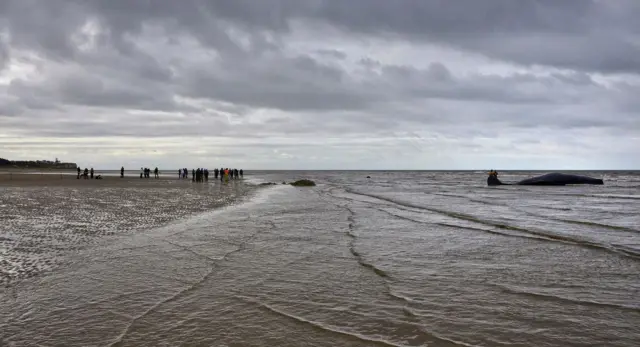 Image source, Gary Pearson
Image source, Gary PearsonWe've been sent this photograph of the whale stranded in Hunstanton.
Thanks to Gary Pearson for sending it in.
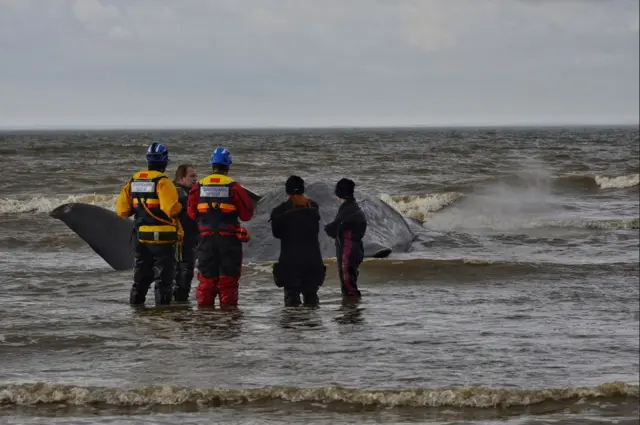 Image source, Gary Pearson
Image source, Gary PearsonIt's been a busy day for the BBC Look East team at the site of the whale stranding:
Allow X content?
This article contains content provided by X. We ask for your permission before anything is loaded, as they may be using cookies and other technologies. You may want to read X’s cookie policy, external and privacy policy, external before accepting. To view this content choose ‘accept and continue’.
Nathan Barnett of the Hunstanton Sealife Sanctuary, external is one of those who has been helping keep the beached bull whale comfortable, in the hope that it can be floated again.
The Hunstanton whale is the sixth sperm whale to beach in The Wash over the past fortnight, and brings the total for the North Sea to 29 over the same period.
But what causes sperm whales to beach? Here's an explainer.
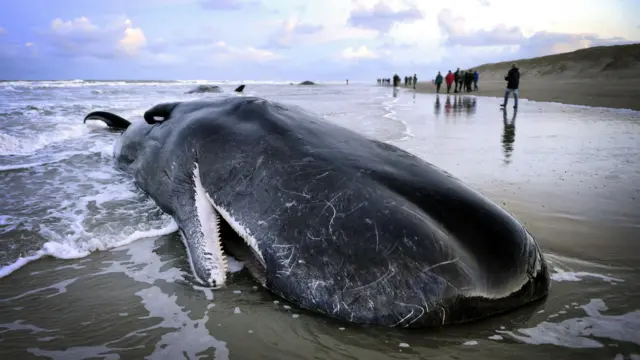 Image source, Getty Images
Image source, Getty ImagesAs the tide comes in over the stranded whale, here's a recap of the story so far, accompanied by some of the pictures you have sent us so far today.
Many thanks, and don't forget you can contact us via email, Facebook, external or Twitter, external.
The tide is coming in on the beach and the whale is partially covered.
These are the latest aerial pictures we have.
Stranded whale now surrounded by water
 Leigh Milner
Leigh Milner
BBC Look East
As the tide came in, partially covering the whale in water, its fin and tail started to push against the sand in a desperate attempt to move off the beach, and it began to blow air through its blowhole.
But it's still where it has been since this morning. Whale expert Ben Garrod tells me that even if it gets into shallow water its lungs are likely to collapse because of amount of time that has passed.
It's very unlikely to survive, he says.
The stranding of a sperm whale on a beach near Hunstanton is the 29th across Europe in the last two weeks.
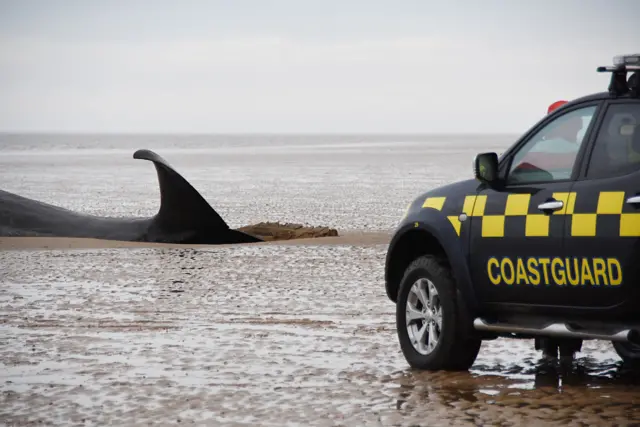 Image source, Ricky-Lee Tompkins/PA
Image source, Ricky-Lee Tompkins/PAStephen Marsh, of the British Divers Marine Life Rescue, external, says strandings can happen naturally and the recent increase might be due to a rise in whale population.
"Females and calves stay in warmer waters, and the males leave as they become sexually active and form bachelor pods... they then go back to the warmer areas on an annual basis to mate," he said.
 Jill Bennett
Jill Bennett
BBC Radio Norfolk
As you can see from this photograph, the tide is now coming in, and the whale is about three-quarters submerged.
The whale, a bull, is flipping its tail and we're waiting for him to turn. The question is whether he can move around.
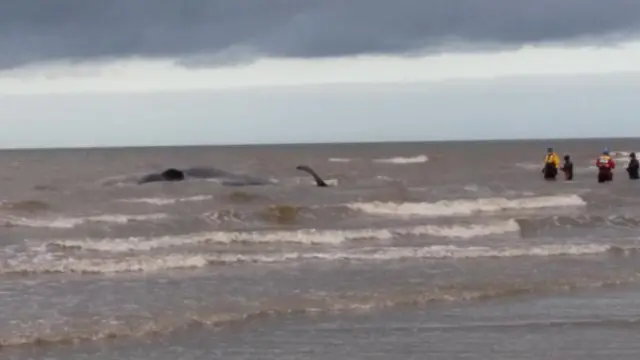 Image source, Kate Dunbar
Image source, Kate DunbarMany thanks to Kate Dunbar for sending us this photograph.
British Divers Marine Life Rescue, external says the sperm whale that's washed up on a beach near Hunstanton is unlikely to survive.
Stephen Marsh says the mammal is likely "to weigh between 25-30 tonnes... we can't lift it or roll it and the vets can't put it out of its misery".
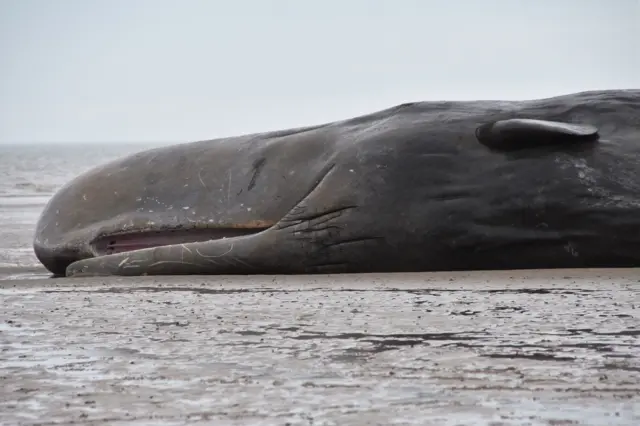 Image source, Ricky-Lee Tompkins/PA
Image source, Ricky-Lee Tompkins/PAQuote MessageThe body will be breaking down and releasing toxins, causing organ failure... it's very sad but we have to let nature take its course."
Stephen Marsh, Operations manager, BDMLR
The whale is beached between Old Hunstanton and Holme-next-the-Sea, about two miles (3km) from the site where another sperm whale beached nearly a fortnight ago.
The site is across The Wash from Skegness, where four other sperm whales beached just days later.
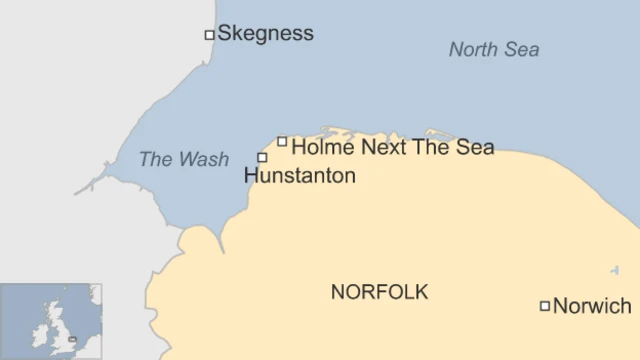
Here's how other media outlets are reporting the beaching of a sperm whale near Hunstanton:
 Zoe Applegate
Zoe Applegate
BBC News
Here is what we know so far about the sperm whale beached at Hunstanton:
The tide is due back in at the site of the whale beaching at about 12:00.
Experts from Hunstanton Sea Life Sanctuary, external say they are hoping to roll the whale back out to sea when that happens.
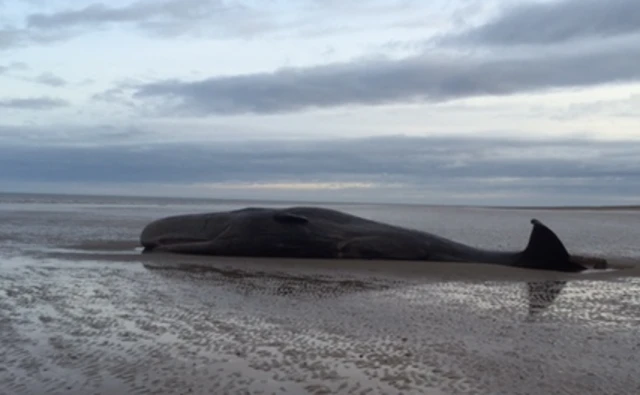 Image source, UK Coastguard
Image source, UK CoastguardAnother sperm whale has beached itself near Hunstanton, nearly a fortnight after a young male sperm whale washed up and died on the beach.
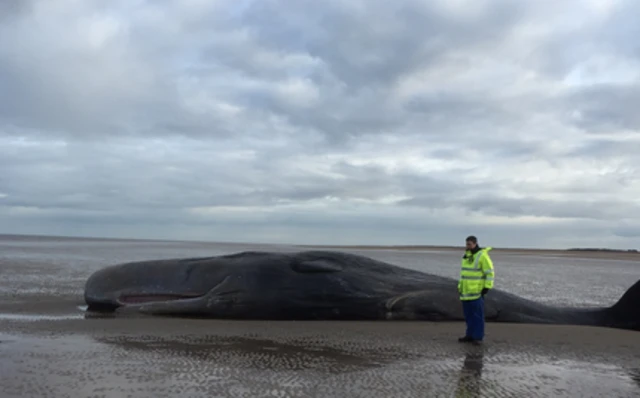 Image source, UK Coastguard
Image source, UK CoastguardJeremy Littlewood, of UK Coastguard, says the whale is the "second to beach itself at Hunstanton and the sixth whale that the UK Coastguard has dealt with in this area... it's a distressing scene and we advise members of the public to keep at a safe distance".
The Receiver of Wreck and the Zoological Society of London have been informed of the stranding.
People are advised to keep a safe distance away from a large sperm whale that beached itself earlier this morning between Old Hunstanton and Holme-next-the-Sea.
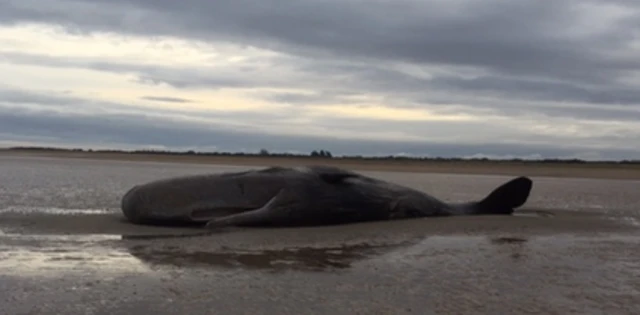 Image source, UK Coastguard
Image source, UK CoastguardUK Coastguard received a call shortly after 07:30 saying that a 14m (46ft) sperm whale had beached itself. Hunstanton Coastguard Rescue Team was sent to the location, and remains at the scene, to assist and ensure people are kept at a safe distance.